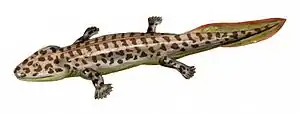| Mandageria Temporal range: Late Devonian | |
|---|---|
 | |
| Skull | |
| Scientific classification | |
| Domain: | Eukaryota |
| Kingdom: | Animalia |
| Phylum: | Chordata |
| Clade: | Sarcopterygii |
| Clade: | Tetrapodomorpha |
| Clade: | Eotetrapodiformes |
| Family: | †Tristichopteridae |
| Genus: | †Mandageria Johanson & Ahlberg, 1997 |
| Species: | †M. fairfaxi |
| Binomial name | |
| †Mandageria fairfaxi Johanson & Ahlberg, 1997 | |
Mandageria fairfaxi (Pronunciation: Man-daj-ee-ree-a fair-fax-i) is an extinct lobe-finned fish[1] that lived during the Late Devonian period (Frasnian – Famennian). It is related to the much larger Hyneria; although Mandageria was smaller, it probably hunted in the same way.
The generic epithet, Mandageria, refers to the Mandagery Sandstone, outcropping near Canowindra, Australia, where the fossils were found. The specific epithet, fairfaxi, honors the philanthropist James Fairfax. M. fairfaxi is the state fossil emblem for New South Wales.[2]
Description
Mandageria was a large predator about 1.6 metres (5.2 ft) long.[1][3] It had a long torpedo-shaped body and large tail fins. Mandageria also had large pectoral fins which could have helped it manoeuvre around submerged logs when preparing to attack its prey.[1] Mandageria had a functional neck joint, an otherwise uncommon feature among fish - Tiktaalik, Tarrasius, placoderms (esp. Arthrodira) and seahorses being other exceptions.[4]
References
- 1 2 3 Age of Fishes Museum, Canowindra
- ↑ "NSW State Flag & Emblems". NSW Government. Archived from the original on 18 September 2015. Retrieved 5 October 2015.
- ↑ Young, G. C.; Dunstone, R. L.; Ollerenshaw, P. J.; Lu, J.; Crook, B. (2019-09-24). "New information on the giant Devonian lobe-finned fish Edenopteron from the New South Wales south coast". Australian Journal of Earth Sciences. 67 (2): 221–242. doi:10.1080/08120099.2019.1651769. ISSN 0812-0099. S2CID 204251345.
- ↑ Johanson, Z.; Ahlberg, P.; Ritchie, A. (March 2003). "The braincase and palate of the tetrapodomorph sarcopterygian mandageria fairfaxi: morphological variability near the fish–tetrapod transition". Palaeontology. 46 (2): 271–293. Bibcode:2003Palgy..46..271J. doi:10.1111/1475-4983.00298.
External links
- Mandageria at Palaeos
- Review of Mandageria
- The braincase and palate of Mandageria fairfaxi
- The fossil skull of Mandageria
- Reconstruction of Mandageria
.jpg.webp)




